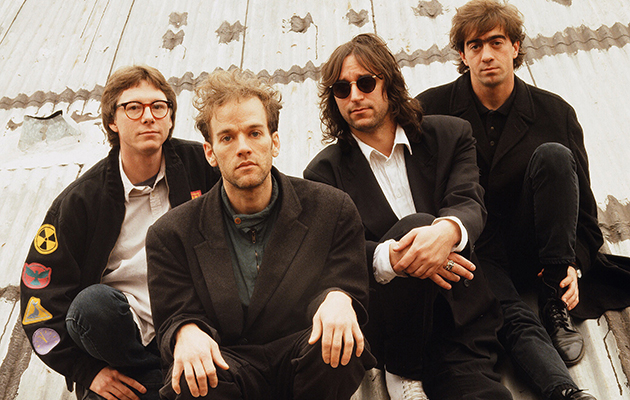http://www.youtube.com/watch?v=0CYitiDJPTE
The photo shoot is over and the REM interviews have begun. Group manager Jefferson Holt is not at work today, so we’re using his office. The band prefer to be interviewed separately and Mills is first in line. He acknowledges that 11 months on the road touring the Green album was a little too long, that it could have been cut by a month. He’s heard the rumours, too. It was said that with Stipe travelling to shows separate from the rest of the band, divisions seemed to be growing.
“It’s kind of a shame that people have these misconceptions about the band, and think Michael is this aloof character that we don’t even speak to. We have one bus where people stay up late, drink beer and watch videos, and we have another where people drink milk, eat cookies and go to bed early. Some people can’t maintain their energy level when they travel.”
You don’t think he’s gotten stranger in the time you’ve been together?
“I’d hesitate to use the word ‘strange’. I’d say he’s become a little happier. That’s about as in-depth as I want to get about Michael.”
Mills cuts short the interview, not because he’s touchy about the enigmatic frontman, but because a call comes through from the local police station to tell him his burglar alarm has gone off. “It’s probably my housekeeper. This happened last week, but I gotta check it out.”
While we wait for REM interviewee number two, aka Michael Stipe, there’s time for a quick perusal of Jefferson’s office and beyond. Pride of place is given to a framed extract from the American equivalent of Hansard. It’s a lengthy speech from September 1989 given in The House of Congress by Georgia’s Democrat Senator Wyche Fowler, praising REM’s support of Greenpeace during the Green tour, referring to them as “a group who measure their success not only in platinum albums but in the positive influence of their music on people”.
As a young kid, Peter Buck used to help his partners paste up election campaign notices for Fowler, so the citation is a kind of payback. The group have considered doing a benefit concert for Fowler’s imminent 1992 campaign but are wary that it could backfire. “Certain people round here might accuse him of hanging out with pagan, satanist rock’n’rollers,” notes Bill Berry.
Not that their political commitment begins and ends with the Senator; the place is full of evidence to show the widespread nature of their interests. Letters of thanks and posters from anti-drug/drink-driving groups, local environmental and preservation lobbies, the national literacy campaign. Elsewhere there’s a proof of the Out Of Time cover. It is designed, as with previous sleeves, by Stipe, who says that getting it finished “almost killed me”.
Beside the toilet, and the first thing that greets people as they climb the stairs, is a lifesize and lifelike bust of Elvis Presley. Propped beside this, at the insistence of the author’s namesake, is the gore-filled gung-ho pulp novel Mercenary, set in South Africa and penned by the other Peter Buck. Once inside the main office you are surrounded by girls. There are girls sweet-talking on the phone, busying themselves with faxes and fanmail, filtering information and requests from pressure groups, record company and fans.
Like U2, their Irish contemporaries, the REM organisation is effectively run by women. The Southern cliché about there being a good woman behind every man holds true here. It is girls that keep this band together, just as girls originally brought them together.
Peter Buck was first attracted to Michael Stipe not because he was a lyrical genius or wore a nice dress, trousers with different coloured legs or dyed his hair with mustard, but for the far more sensible reason that he had a strikingly beautiful sister. Likewise, Bill Berry befriended his colleagues not because they were the future of American rock’n’roll but because “I really wanted to get into the pants of a girl they knew, Kathleen O’Brien. Boy was I hot for her.”
When he arrives back for his interview, Stipe has changed. Gone are the baggy grey trousers, mohair frock cardigan and boots he wore for the shoot. They have been swapped for something “more comfortable” – a denim jacket embossed with big yellow stitches, elaborately patched baggy jeans and Jesus sandals. He adopts a near aggressive manner and a petulant drawl – “Are you ready for me now, boy?” – as he swaggers into the room. I offer him the seat behind his manager’s desk, hoping that it doesn’t give him power-crazed yearnings. The response is typically deadpan.
“No, it won’t make me any more powerful than I already am,” he says.


